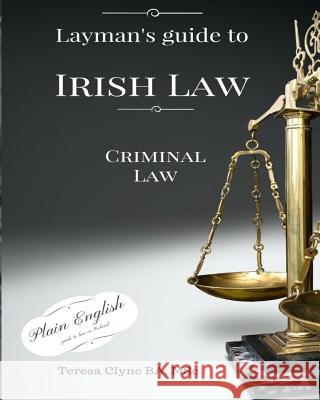Layman's Guide to Irish Law: Criminal law » książka
Layman's Guide to Irish Law: Criminal law
ISBN-13: 9781530660261 / Angielski / Miękka / 2016 / 134 str.
Legal writing in plain English. Law guidebooks using plain English which is easy to understand using clear concise plain wording. Welcome to my series of law guidebooks for beginners. Criminal Law A crime is defined in law in Ireland as an act which may be punished by the State. The way in which a criminal offence is investigated and prosecuted depends on the type of crime involved. For these purposes criminal offences may be described in different ways such as: *Summary offences *Indictable offences *Minor offences *Serious offences *Arrestable offences There are two ways criminal offences can be tried in Irish law: *In the lower court (District Court) before a judge without a jury (summary). *In the higher courts (Circuit Criminal Court, Central Criminal Court) before a judge and jury (indictable). Actus Reus Mens Rea Intention What is Criminal Law? Article 40 of the constitution of Ireland Summary and indictable offences Minor and non-minor offences Serious and non-serious offences Arrestable and non-arrestable offences Accomplice to Crime Principal in Crime Accessory after the Fact Differences between Crimes and Torts Inchoate Offences Incitement Conspiracy Attempt Public order offences in Ireland Intoxication (being drunk) in a public place Disorderly conduct in a public place Threatening, abusive or insulting behaviour in a public place Begging in an intimidating or threatening manner Distribution or display in a public place of material which is threatening, abusive, insulting or obscene Failure to comply with the direction of a member of An Garda Siochana Wilful obstruction Entering a building, etc, with intent to commit an offence Trespass on a building, etc Riot Violent disorder Affray Blackmail, extortion and demanding money with menaces Assault with intent to cause bodily harm or commit an indictable offence Assault or obstruction of a peace officer Attacks on emergency service personnel Indictable offences: Summary offences: The Prosecution of Crime District Court Summons Procedure The Validity of the Summons Time Limits for the Issuing of A Summons Indictable Offences Time Limits Charge Sheet Procedure Right to Silence and against Self-incrimination Bail Arrests Arrest without a warrant Entry and search of a premises to carry out an arrest Manner of Arrest Search of the Arrested Person Procedure after Arrest Immunity from Arrest An arrestable offence under the Criminal Law Act 1997 Section 30 of the Offences Against The State Act 1939 Periods of Detention: Section 30 of the Offences Against the State Act 1939 Section 4 of the Criminal Justice Act 1984 Section 2 of the Drug Trafficking Act 1996 Drug offences Customs National Drug Team Possession of any other controlled drugs Growing cannabis plants or opium poppies Regulations regarding opium Possession of controlled drugs for sale or supply Use of premises, vehicles or vessels for certain activities Forged or fraudulently altered prescriptions Attempting or helping others to commit an offence Court-ordered drug treatment The Definition of Homicide Voluntary Manslaughter: Section 4 of the Criminal Justice Act, 1964, which provides: A life sentence is mandatory for murder Capital Punishment Death Penalty Facts Manslaughter and Provocation Fatal Assault Manslaughter Criminal Negligence Duty to Act Act or Omission Euthanasia Non-voluntary Euthanasia Theft, Burglary, Aggravated Burglary and Robbery Section 4 of the Criminal Justice Act 2001 Actus Reus and Mens Rea of theft Theft, robbery and burglary. Aggravated burglary s. 13 the Criminal Justice Act 2001 Penalty s. 13(3) the Criminal Justice Act 2001 Section 14 Criminal Justice Act 2001 The defence of Intoxication Intoxication by Drugs The Burden of Proof Defence of Mistake Defence of Insanity Fit or unfit to be tried Not guilty by reason of insanityDiminished responsibility in murder cases Constrained Choice Defence of Necessity
Zawartość książki może nie spełniać oczekiwań – reklamacje nie obejmują treści, która mogła nie być redakcyjnie ani merytorycznie opracowana.











